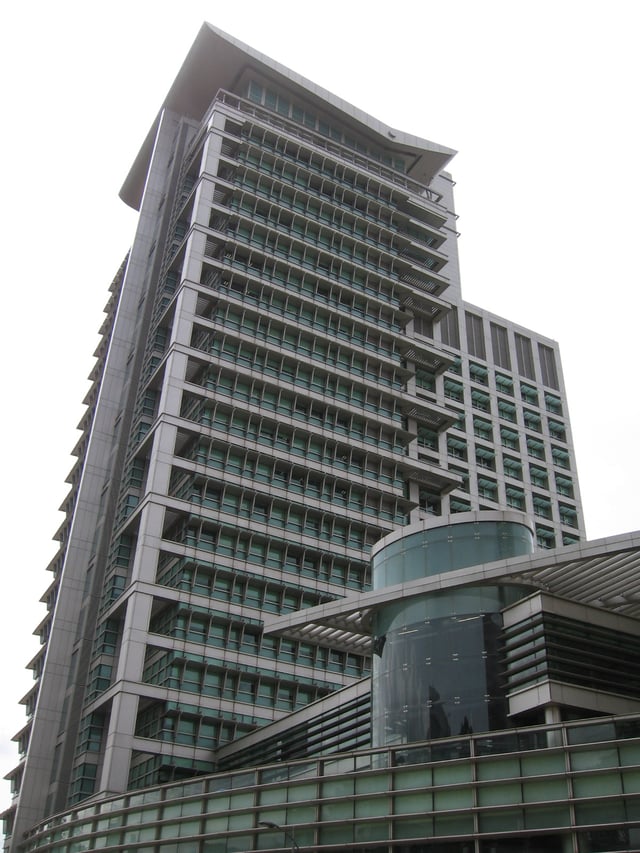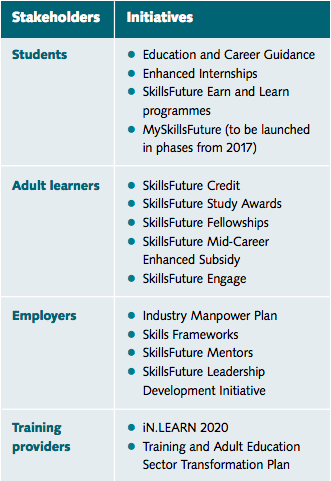Ministry of Education (Singapore)
-3vcQCS6nWXzxais05fmzpCJyiQGaUl)
Ministry of Education (Singapore)
-3vcQCS6nWXzxais05fmzpCJyiQGaUl)
| Agency overview | |
|---|---|
| Formed | 1960 |
| Jurisdiction | Government of Singapore |
| Headquarters | 1, North Buona Vista Drive, Singapore 138675 |
| Employees | 62,964[1] |
| Annual budget | |
| Ministers responsible |
|
| Agency executives |
|
| Child agencies |
|
| Website | www.moe.gov.sg [21] |

Ministry of Education headquarters at Buona Vista

Stakeholders and initiatives chart for SkillsFuture.
The Ministry of Education (Abbreviation: MOE; Malay: Kementerian Pendidikan; Chinese: 教育部; Tamil: கல்வி அமைச்சு) is a ministry of the Government of Singapore that directs the formulation and implementation of policies related to Education in Singapore. It is currently headed by Minister Ong Ye Kung who oversees education from Primary 1 to tertiary institutions.
| Agency overview | |
|---|---|
| Formed | 1960 |
| Jurisdiction | Government of Singapore |
| Headquarters | 1, North Buona Vista Drive, Singapore 138675 |
| Employees | 62,964[1] |
| Annual budget | |
| Ministers responsible |
|
| Agency executives |
|
| Child agencies |
|
| Website | www.moe.gov.sg [21] |
Budget
The Government of Singapore invests heavily in education to equip citizens with the necessary knowledge and skills to compete in the global marketplace.[3] Singapore currently spends around 1/5 of its national budget on education.[4] To boost its economic standing, the Government of Singapore created a mandate that most Singaporeans learn English. As a result, the country rose from one of the most impoverished Asian countries to one with the strongest economies and highest standards of living.[5]
Statutory boards
The ministry currently oversees 10 statutory boards:
Committee for Private Education
Singapore Polytechnic
Ngee Ann Polytechnic
Temasek Polytechnic
Nanyang Polytechnic
Republic Polytechnic
Institute of Technical Education
ISEAS–Yusof Ishak Institute
Science Centre, Singapore
Singapore Examinations and Assessment Board
In 2016, a new statutory board under the Ministry of Education (MOE), SkillsFuture Singapore (SSG), was formed to drive and coordinate the implementation of SkillsFuture. It took over some of the functions currently performed by the Singapore Workforce Development Agency (WDA) and absorbed the Committee for Private Education (CPE).
SkillsFuture
The SkillsFuture initiative was introduced in 2014 to support Singapore’s next stage of economic advancement by providing lifelong learning and skills development opportunities for Singaporeans.[6] SkillsFuture aims at unlocking the full potential of all Singaporeans, regardless of background and industry.[7] The program contains several key initiatives, such as SkillsFuture Credit and SkillsFuture Earn and Lean. SkillsFuture caters to many stakeholders, with initiatives centred on students, adult learners, employers, and training providers.[8] In general, SkillsFuture involves a broad array of policy instruments targeting a wider range of beneficiaries over a longer-term horizon – schooling years, early career, mid-career or silver years – with a variety of resources available to help them attain mastery of skills.[9]
There are four key objectives of the SkillsFuture initiative:
Helping individuals make well-informed choices in education, training and careers.
Developing an integrated, high-quality system of education and training that responds to constantly evolving industry needs.
Promoting employer recognition and career development based on skills and mastery.
Fostering a culture that supports and celebrates lifelong learning.[10]
Every Singapore citizen from the age of 25 is given S$500 (approximately $370) by the Singapore government for the SkillsFuture Credit to invest in their personal learning.[11] This sum can be used for continuing education courses in local tertiary institutions, as well as short courses provided by training providers such as Data Science Dojo [22] and MOOC providers such as Udemy, Coursera, and edX.
SkillsFuture has established a multi-level training system with dozens of initiatives and programs targeting the different skill-training needs of different social groups, such as students and employees in different career stages. Moreover, SkillsFuture also invests in forms of industry collaboration to uplift the broad base of private companies, and strengthen collaboration between training institutions, unions, trade associations, and employers to develop the skills of the Singaporean workforce.[15] In terms of funding, according to the Singaporean government budget report, a provision of $220 million has been made for SSG in the fiscal year 2018 to implement plans, policies and strategies to support skills development programs under SkillsFuture.[16]
Autonomous Universities
National University of Singapore
Nanyang Technological University
Singapore Management University
Singapore University of Technology and Design
Singapore Institute of Technology
Singapore University of Social Sciences
Unions
Civil servants employed by the Ministry of Education are organised into several Unions, including the Singapore Teachers' Union, Singapore Chinese Teachers' Union, Singapore Malay Teachers' Union and Singapore Tamil Teachers' Union for Education Officers; and the Amalgamated Union of Public Employees for the non-Education Officers. All these unions are affiliates of the National Trades Union Congress.
Minister for Education
| Years in Office | Minister |
|---|---|
| 1959 – 1963 | Yong Nyuk Lin |
| 1963 –1970 | Ong Pang Boon |
| 1972 – 1975 | Lee Chiaw Meng |
| 1975 | Toh Chin Chye |
| 1975 – 1979 | Chua Sian Chin |
| 1979 – 1984 | Goh Keng Swee |
| 1985 – 1992 | Tony Tan |
| 1992 – 1997 | Lee Yock Suan |
| 1997 – 2003 | Teo Chee Hean |
| 2003 – 2008 | Tharman Shanmugaratnam |
| 2008 – 2011 | Ng Eng Hen |
| 2011 – 2015 | Heng Swee Keat |
| 2015 – 2018 | Ng Chee Meng (Schools) & Ong Ye Kung (Higher Education and Skills) |
| 2018–present | Ong Ye Kung |
Sources
[[INLINE_IMAGE|//upload.wikimedia.org/wikipedia/commons/thumb/7/78/Definition_of_Free_Cultural_Works_logo_notext.svg/12px-Definition_of_Free_Cultural_Works_logo_notext.svg.png|//upload.wikimedia.org/wikipedia/commons/thumb/7/78/Definition_of_Free_Cultural_Works_logo_notext.svg/18px-Definition_of_Free_Cultural_Works_logo_notext.svg.png 1.5x, //upload.wikimedia.org/wikipedia/commons/thumb/7/78/Definition_of_Free_Cultural_Works_logo_notext.svg/24px-Definition_of_Free_Cultural_Works_logo_notext.svg.png 2x|Definition of Free Cultural Works logo notext.svg|h12|w12]] This article incorporates text from a free content work. Licensed under CC BY-SA License statement [23] : Lifelong Learning in Transformation: Promising Practices in Southeast Asia [24] , 1-62, Yorozu, Rika, UNESCO. UNESCO. To learn how to add open license text to Wikipedia articles, please see this how-to page. For information on reusing text from Wikipedia, please see the terms of use.